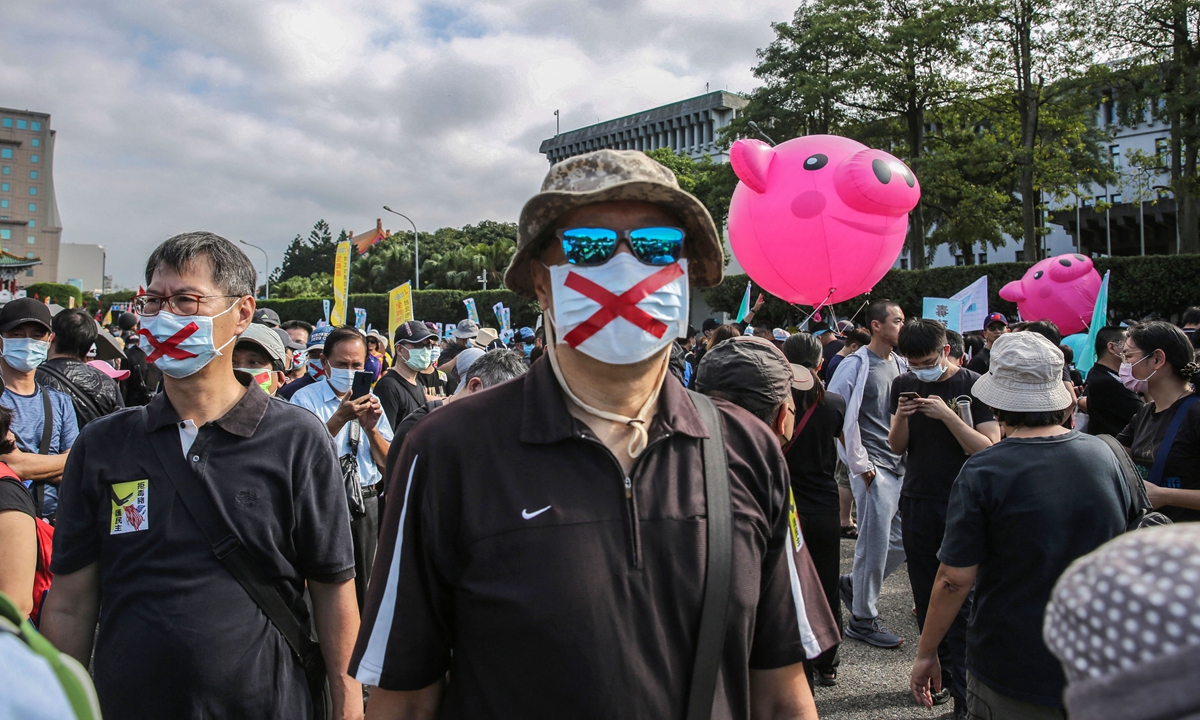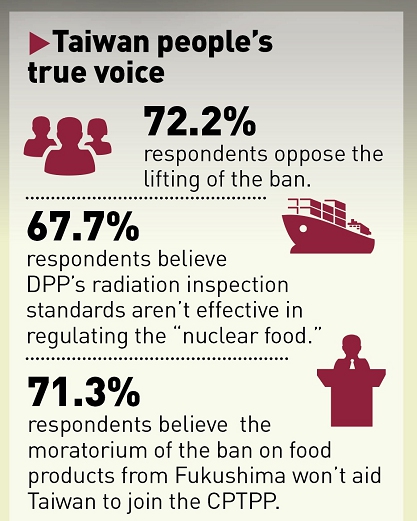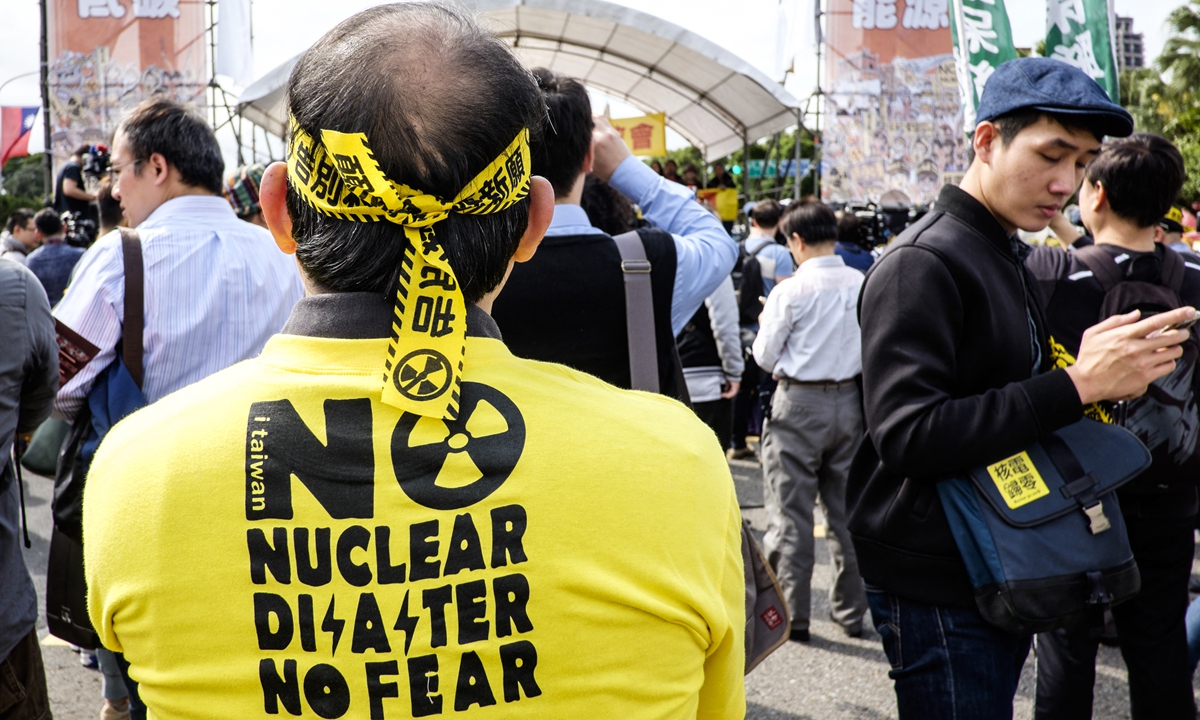
People protest against the lifting of restrictions on US pork containing ractopamine in Taipei on November 22, 2020. Photo: AFP
The surprise lifting of a ban on importing food from five prefectures in Japan around the site of the 2011 Fukushima nuclear disaster by the Democratic Progressive Party (DPP) authority has sparked anger in the island of Taiwan.
After being banned for more than a decade, the "nuclear food" as it is known by Taiwan people, will finally be allowed to return to the island's dinner tables, which is regarded by local media and observers as another betrayal of the public opinion by the DPP authority after the reauthorization of ractopamine-enhanced pork imports from the US.
Importing toxic food and generously gifting scarce masks to the US in the face of local emergency shortages, the DPP has engaged in countless cunning political calculations against the interests of the Taiwan people, to enhance international visibility or initiate skewed "international cooperation."
To pursue its political interests and separatist conspiracy, the DPP goes against the will of people on the island, negatively impacting public health and safety, said Ni Yongjie, deputy director of the Shanghai Institute of Taiwan Studies. "It is messing up Taiwan with fascist-like deeds."
Artificial arguments down people's throats
Following the Fukushima nuclear power plant disaster caused by the massive in 2011, Taiwan's authorities banned food imports from Fukushima for over a decade. In 2018, the island held an anti-nuclear food referendum where Taiwan people supported the existing ban with 7.79 million votes.
However, the sudden announcement by the DPP authority to lift the ban is not a change in public opinion in Taiwan. The Japan Times said that island's leader, Tsai Ing-wen, prioritized Japan-related food issues in trying to win Japan's support for Taiwan's entry into the Comprehensive and Progressive Agreement for Trans-Pacific Partnership (CPTPP).
In the face of fierce public protest, Tsai asserted that since 2016, the local authorities have completed six assessment and investigative reports, and enacted strengthening measures on the imported foods monitoring.
Ironically, local media cited expert analyses as saying that much of the leaked radioactive material is still radioactive.
The Chinese Kuomintang (KMT) party revealed that the DPP intentionally shortened the policy notice period from 60 to 10 days, and only Kaohsiung, Taichung, and New Taipei City presently have radiation inspection equipment, Tsai and the DPP's alleged commitment has only been lip service.
Some DPP members on January 16 suggested that the food should be referred to as "Fu food" rather than "nuclear food." "Fu food" may refer to Fukushima food but also means "blessed food" in Chinese, a term likely more acceptable to Taiwan people.
The DPP even released a so-called poll on February 9, indicating that 58.7 percent of the public support the distribution of Fukushima food
The KMT revealed that the "poll" only used "Japanese food" as a substitute, failed to mention the radiation risk associated with such food.

Source: Taiwan Yahoo news poll conducted between February 8 and February 11. Graphic: GT
"It showed DPP's hand by directly announcing the embrace of 'nuclear food' by the end of month," Ni sighed. "The DPP authority completely forgets about public interests."
By opening the door to "nuclear food," the DPP authority rush to improve relations with Japan. The DPP regards Japan as a main ally on the "international stage" that can help with DPP's secessionist strategy, Ni said.
Put Taiwan people asideLooking back at Tsai's recent years in office, the island has been gripped by concerns over food safety and public health.
Taiwan reportedly started importing ractopamine-enhanced pork from the US in January 2021, after the island's DPP-dominated legislative body approved acts to lift restrictions on such pork.
Ractopamine is banned from food production in at least 160 countries and regions including the European Union. Regardless of the 70 percent dissent by the Taiwan residents, as a local poll showed, the DPP actively paved the way for imports of the controversial pork to appease the US.
Head of Taiwan's health authority Chen Shih-chung once said he was willing to "eat ractopamine-enhanced pork for three consecutive months" as importing the pork could enhance Taiwan's "international status," though such attempts did nothing to quell public anger.
During the COVID-19 pandemic, the Tsai authority further enraged the Taiwan public by utilizing essential anti-epidemic supplies including medical masks and vaccines to pursue its separatist agenda.
In March 2020, DPP reportedly signed a "jointly statement" with the US and promised to provide it with 10,000 medical masks per week. A month later, the DPP announced a total of 16 million donated masks globally.
Ironically, the DPP made the promise when the island seriously lacked masks. As Taiwan media reported in February and March of 2020, local residents were only allowed to buy two or three masks each week. There were long queues at the pharmacies at that time.
In May 2021, the DPP authority announced the purchase of 10 million doses of COVID-19 vaccines from local producers Medigen Vaccine Biologics Corp (MVC) and United BioPharma (UB) at a cost of NT$750-881 ($26.9-31.6) per dose, much more expensive than the vaccine produced by the world's current major brands including Oxford-AstraZeneca ($4) and Moderna ($15), reported Taipei-based United Daily News in June 2021. Prior to that, DPP had rejected vaccines provided by the Chinese mainland, and turned down private purchases or donations even amid severe vaccine shortages.
According to an exclusive report by Reuters in June 2021, UB-612 vaccine is developed by private US firm COVAXX. Sources told Reuters that Erik Prince, former head of Blackwater, invested in COVAXX in 2020.
Blackwater is known for providing intelligence, training, and security services to the US army and government. After the real entity behind the development of the UB-612 vaccine was revealed, Taiwan social media platforms were flooded with recriminations about DPP's lies to the people in the interests of American big business and a possible US-led political alliance.
"The government uses large amount of public money to purchase the [UB-612] vaccine in the name of 'supporting a Taiwan-developed vaccine; but the fact is, the vaccine is from the US," Taiwan's TV commentator Huang Chih-hsien wrote on Facebook in June 2021.

Taiwan people demonstrate in the streets of Taipei in March 2017 in a rally against nuclear energy. Photo: AFP
The DPP authority have frequently caused public anger due to their traitorous behaviors during the past years, and they are aware of the anger caused, Ni said. "They just don't care, as long as this separatist party can benefit," he said.
Sadly, the DPP's behaviors were paid by the whole of Taiwan, Ni noted. "The consequences of it ignoring food security and public health will be borne by all the residents and their offspring on the island," he told the Global Times.






